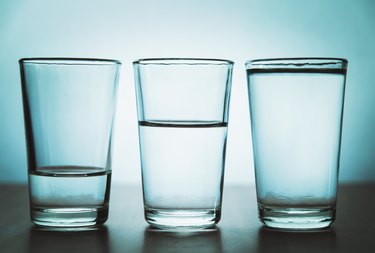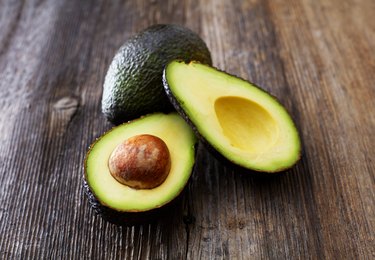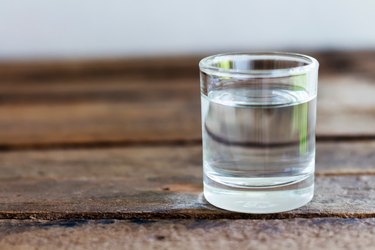
Edema, bloating and water weight are all ways to describe the common physical phenomenon known as water retention. The good news is, there are ways to reduce water weight naturally. Lifestyle changes and natural diuretics may be useful for losing water weight, reducing fluid retention and getting rid of edema in the feet, legs and body.
But how can you tell if you're retaining water, and is water retention bad or unhealthy? What causes it? Keep reading to learn more.
Video of the Day
Video of the Day
What Is Water Weight?
Water retention occurs when the body stores excess fluid in the tissues. "It's normal for your weight to fluctuate up to 5 pounds daily due to water weight," says the National Academy of Sports Medicine (NASM).
Fluid regularly enters your body tissues from your blood. Normally, excess fluid is excreted from your body, so you don't even realize it's there. In some cases, however, fluid isn't removed correctly from your tissues and causes water retention, medically referred to as edema.
Edema has a number of causes, many of which are not serious. For example, some women may experience mild water retention in the days or weeks before their menstrual cycle starts. "It's true for women especially that changes in hormones, due to menstruation and pregnancy, can cause the tissues to retain excess water," reports the NASM. "Thankfully, this type of water weight gain will usually be resolved on its own."
More severe forms of water retention occur when the body is unable to clear excess fluids through urine, or when the lymph system is no longer functioning properly. Severely obese people may experience edema in the extremities as a consequence of the excess weight.
If you have a clean bill of health from your doctor but you're still experiencing edema, try reducing water retention naturally.
Warning
In some cases, water retention can indicate an underlying health problem. If you have frequent bouts of edema beyond monthly hormonal changes, consult your physician. Same goes if you experience sudden weight gain — even if you think it's just water weight.
Are You Retaining Water? Here's How to Tell
The Cleveland Clinic describes a quick and easy test to perform when you want to check for water retention: Simply press a finger on the area that seems swollen for five to 15 seconds. (This is called a "pitting test.") If you have edema, your finger will leave an impression, or pit, in your skin for anywhere from a few seconds to three minutes.
Puffiness or swelling in your face, hands, ankles and/or feet are signs of water weight as well. Your skin may also appear shiny and feel stretched or bloated if you are retaining water.
3 Ways to Reduce Edema Naturally
Get Moving
As the Cleveland Clinic notes, edema of the lower limbs sometimes has a very simple and logical cause: gravity! "If you spend a lot of time sitting or standing in one place for too long, water naturally pulls down into your arms, legs and feet," they explain. This is known as "dependent edema," and just going on a short walk can get rid of it. Elevate your feet to encourage blood and lymph flow and relieve swelling, and take frequent breaks if you stand or sit a lot.
Cut Back on Salt
Your kidneys are responsible for balancing the amount of sodium and water in your body. When your sodium levels are high, your kidneys hold on to excess water in an attempt to dilute the sodium. If you regularly eat too much salt, this can lead to water retention and even high blood pressure, according to Oregon State University's Linus Pauling Institute (LPI).
"In general, sodium retention results in water retention, and sodium loss results in water loss," they explain. "Excessive intakes of sodium chloride lead to an increase in extracellular fluid volume as water is pulled from cells to maintain normal sodium concentrations outside of cells."
That's why, if water weight is a concern, cutting back on your sodium intake is a smart first step. Avoid eating high-sodium foods, which may trigger water retention. Canned and processed foods are common culprits; replace them with fresh produce when possible, and cook with sodium-free spice mixes instead of salt. Stay away from cured and processed meats, too, because they are also high in sodium. The recommended adequate sodium intake for everyone aged 14 and up is 1,500 milligrams per day, observes the LPI.
Drink More Water
It may seem counterintuitive, but an effective way to reduce water retention is to drink more water, especially if your diet is high in sodium. See, when you are well hydrated, your body is less likely to hold on to excess water in an attempt to maintain sodium balance.
"If you do not take in enough fluids or water, you become dehydrated," explains the U.S. National Library of Medicine (NLM). "Your body may also have a hard time getting rid of fluids. As a result, excess fluid builds up in the body. This is called fluid overload (volume overload). This can lead to edema (excess fluid in the skin and tissues)."
Anyone looking to avoid bloating should also avoid drinking alcohol, which has long been notorious for making fluid retention and puffiness worse. "Alcohol causes your body to produce more urine," says the Mayo Clinic. "In turn, urinating more than usual can lead to dehydration."
How much water is enough? Forget the old "8 glasses a day" rule: The University of Missouri System and others now recommend drinking half your weight in ounces of water each day. That means that if you're 150 pounds, you should be drinking at least 75 ounces, or just over 9 cups, of water per day — and even more if you exercise (read: sweat a lot), especially in the heat.
Tip
Mix things up by drinking coconut water in addition to plain water. Coconut water is high in potassium, an electrolyte that helps flush sodium out of the body, according to the American Heart Association (AHA). Therefore, drinking coconut water could help reduce water retention and fight bloat. "The more potassium you eat, the more sodium you process out of the body," says the AHA. For maximum health benefits, choose coconut water varieties that don’t contain added sugar or artificial ingredients.
3 Natural Diuretics
"Water-based fruits and veggies don't just provide vitamins and minerals — they can also be good natural diuretics," says the Cleveland Clinic. "The trick is how you use them. Avoid taking [them] in a concentrated form if your need for releasing fluid retention is not disease-based, medication-based or directed by a doctor."
Three of the plants on their list are dandelion, ginger and parsley.
Dandelion
Dandelion is often thought of as nothing more than a weed, but the perennial plant is not only full of vital nutrients such as vitamin A, vitamin C, iron and potassium: It can also reduce water retention. "Dandelion may act as a diuretic, causing your body to produce more urine to get rid of excess fluid," says Mount Sinai.
Ginger
"Eating ginger can cut down on fermentation, constipation and other causes of bloating," notes a health article published by Johns Hopkins Medicine.
Parsley
"Parsley increases fluid loss," reports Tufts Medical Center.
But though dandelion, ginger and parsley are all natural plants, consuming them isn't recommended for everyone. Mount Sinai cautions that dandelion, for example, interacts negatively with many medications. Ginger, meanwhile, should be avoided by people who have bleeding disorders and those on blood thinners or medications for diabetes or high blood pressure, Mount Sinai reports.
And Tufts notes that people who are allergic to fennel, carrots or celery should give parsley a wide berth — as should anyone prone to sunburn, since the plant can make the skin more sun-sensitive.
Diuretics in general can make prescription medications leave your body faster, potentially reducing their effectiveness and harming your health. "If you also take prescription diuretics, or other herbs that act as diuretics, you could be at risk of electrolyte imbalances," warns Mount Sinai.
That's why it's important that you talk to your doctor or nutritionist before consuming natural diuretics such as dandelion, ginger or parsley — especially if you're on prescription medication.
- Linus Pauling Institute: "Sodium (Chloride)"
- American Heart Association: "A Primer on Potassium"
- Mount Sinai Health Library: "Ginger"
- Johns Hopkins Medicine: "Ginger Benefits"
- Mount Sinai: "Dandelion"
- Tufts Medical Center: "Parsley"
- Cleveland Clinic: "Natural Diuretics to Reduce Water Retention"
- Cleveland Clinic: "Edema"
- National Academy of Sports Medicine: "How to Lose Water Weight Effectively"
- U.S. National Library of Medicine: "Fluid Imbalance"
- University of Missouri System: "How to Calculate How Much Water You Should Drink"
- Mayo Clinic: "Hangovers"




